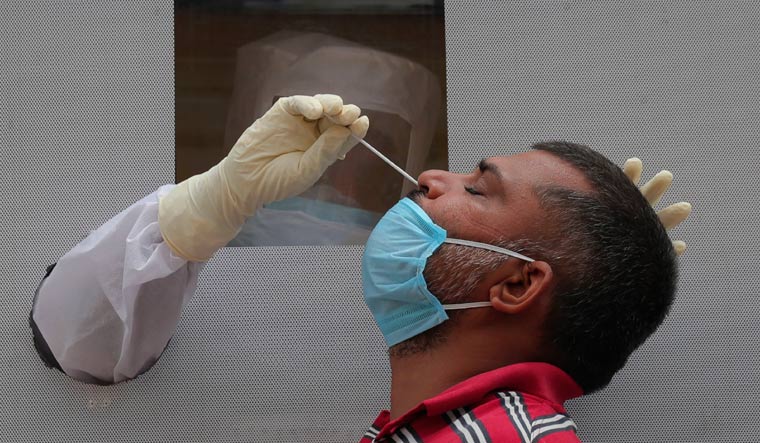Over half of Delhi’s population has developed antibodies against SARS-CoV2, the latest sero survey in the city has shown. According to Delhi health minister Satyendra Jain, the latest sero survey is the largest one yet, and shows that overall 56.13 per cent of Delhi’s population has been exposed to the virus, and developed antibodies against it. The percentage is highest in south-east Delhi, where 62 per cent of the population was found sero-positive, while the lowest sero positivity was found in the north district. Jain said that 28,000 samples were taken for the survey, the largest number till date, and the survey was conducted in the month of January (January 15-23).
The highest and the lowest apart, other districts in Delhi showed similar sero positivity — 58.81 per cent sero positivity in east, 56.78 per cent in central, 56.73 per cent in Shahdara and 56.76 per cent in south. Previous sero surveys in Delhi have shown that a quarter of the city’s population had developed antibodies — the first survey in July showed that 23.48 per cent had antibodies, the second survey in August showed 29.1 per cent, the third in September showed 25.1 per cent, while the fourth done in October showed 25.5 per cent.
Dr Nutan Mundeja, director general health services, Delhi government, said, "We have conducted this sero survey along with Maulana Azad Medical College. We have used CLIA technology, which is a more sensitive technology than ELISA technology, and the samples have been tested at ILBS, Delhi so that there is uniformity across the city. We have taken 100 samples from every type of population in each ward, and we have successfully been able to do it with the help of our health team and the ILBS team.”
Though the latest results imply that majority of the population in Delhi — one in two persons — have had some exposure to SARS-CoV2 (largely asymptomatic) and developed antibodies, too, experts say that it doesn’t guarantee immunity for those who have shown sero positivity. This is because sero surveys only measure humoural immunity or short-term immediate immunity via antibodies. Tests used during sero- surveys don’t measure T-cell or long term immunity.
The concept of herd immunity, too, has been widely debated during this pandemic, and immunologists say that it has been largely “misunderstood”. According to Dr Nimesh Gupta, head, vaccine immunology laboratory, National Institute of Immunology, there are still several unknowns such as declined immunity in infected individuals, presence of super spreaders, and the expansion in both the virus spread and susceptible age groups, due to which the concept of herd immunity can’t be understood as a “steady state”.
“It’s merely a theoretical juggling to reach some number, which has no meaning in pandemic control response,” Gupta said. Recovered COVID-19 patients in India, however, had durable and good quality immunological memory, a study at NII has indicated. Gupta said that those individuals could be in the “last slab” of receiving a COVID-19 vaccine. More data was needed to ascertain recovered patients could be given single dose booster shots of vaccine, Gupta said.
Prior exposure and some antibodies against the virus as shown in the survey don’t imply that people should not give up COVID-19 appropriate behaviour such as social distancing and the use of masks, Jain said. “Cases have gone down considerably and have been lower than 200 for the last 10-12 days. The positivity rate is even lesser than 1 per cent for the last one month. I want to request you to please wear a mask, despite lower corona cases, declining positivity rate, and lesser patients in hospitals. Please take care of covid appropriate behaviour.”





